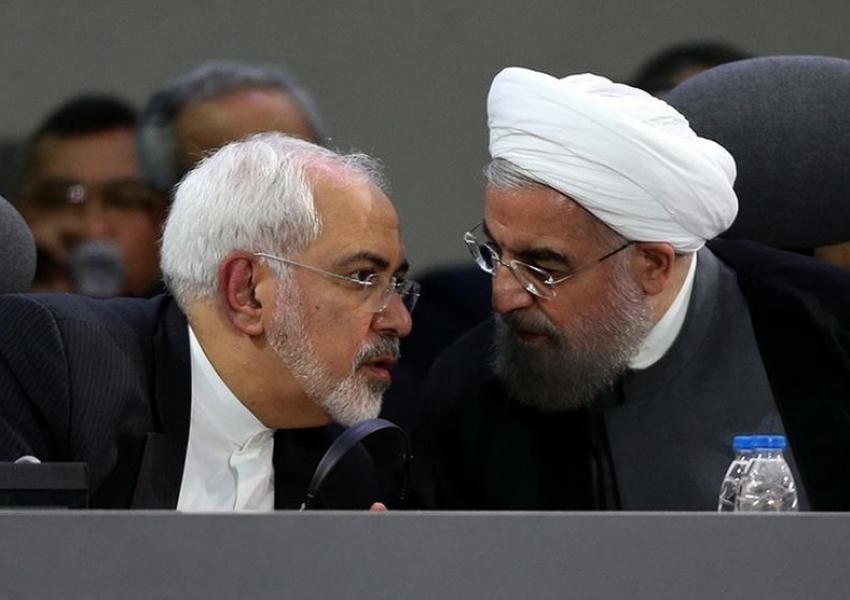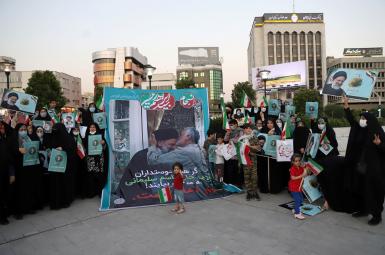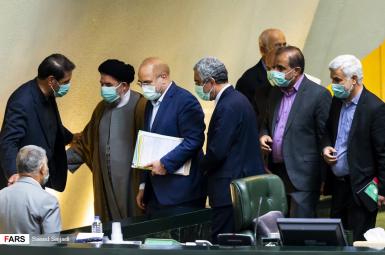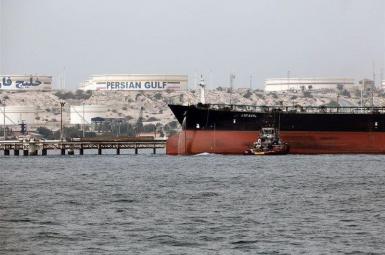
Rouhani’s Three Distinct Foreign Policies
40-year-old plans and principles guide Iran’s foreign policy. These principles include taking hostage of western citizens with dual nationality, forming and supporting militia groups to destabilize the region, leaving foreign policy to the Revolutionary Guards (IRGC) and appeasing Russia and China. Nevertheless, Rouhani’s administration has followed a distinct foreign policy. Below, I will discuss the consequences of policies adopted by Rouhani and his foreign minister, Zarif.
Organized Lobby
Ever since Zarif was appointed as foreign minister, an extensive lobby has been going on in the US and other countries. Following his trip to New York, Rouhani stated in a press conference: “Israel has a strong lobby in the U.S. and a lot of influence in the Congress. They have done a lot of work and we need to fill the vacuum and create a strong Iranian lobby in Washington. I think the Iranians who live there should take the first steps in this regard. I proposed this in my meeting with the Iranians (in the U.S.) and said that all Iranians in America are our voice and should echo the Iranian realities.” (Alef Newspaper, October 3, 2013). Interestingly, a lot has been done for his wish to become a reality.
Long before Zarif became the minister, there were others, university professors or employees at private companies, who would lobby for Iran; but this level of involvement would not content Zarif and Rouhani. They wanted people who can do the job professionally and be established in political centers and western capitals. They focused on Muslim societies, Iranian supporters of the regime and groups who hate the US, its foreign policy and Israel. They mostly concentrated on forming groups that can influence American public opinion, make ways to negotiate with the White House and Congress and replace faithful agents in key state organizations such as the foreign ministry, VOA and civil organizations through producing content, making TV interviews and publishing statements.
Today, though neither he nor his lobbyists recognize it, Rouhani enjoys such a lobby. While advertising the Islamic Republic’s policies and lobbying for the regime, the lobbyists present themselves as human rights activists or political analysts.
Rouhani’s foreign ministry has always given priority to lobby with western powers; nowadays this lobby is active in North America and Europe under different names and despite the sanctions and financial problems, there has never been a scarcity of resources for its lobby. Once Iran’s lobby started to work, its complaints about Israel and Saudi Arabia’s strong lobbies began to wane.
Because Zarif knew America’s internal politics very well, he chose the most propitious time for initiating negotiations: Obama's presidency; not only did they face no problem from Obama's cabinet, but lobbyists were positioned in the foreign ministry and various governmental and non-governmental organizations; some of these lobbyists even frequented the White House.
This lobby did not grow weaker when Trump came to power; surprisingly, the lobby went ahead more vigorously. Every day, they publish in anti-Trump media and they welcome content against Trump’s foreign policy. It is such a strong lobby that it can provoke John Kerry and his team to defy Trump for leaving the Nuclear Deal.
Undeclared Agreement between European/American Left and Shiite Imperialism
Zarif and Rouhani are aware of Khamenei, the Revolutionary Guards, and the Shiite Clergies’ ambitious desires; they also understand the European/American left’s anti-Saudi and Israeli sentiments and their intention to ally themselves with anti-American forces. They know that the regime pursues its internal suppression and regional ambitions of expanding the area under Shiite imperialism; they are also aware that the Western Left attempts to reinforce its power at home and turns a blind eye to the Islamic Republic’s expansionism in the Middle East and its rampant ignorance of human rights and mass murder. Israel and Saudi Arabia are not allowed off the hook so easily, though. American media was reporting on the death of Khashoggi for over a year, and every single move from Israel is carefully reported; yet, the media kept silent for weeks when the IRGC was killing Iranians, and the Popular Mobilisation Front was murdering Iraqis until they reached a point where they could no more ignore the events. Eventually, some American media published the news of November unrest in Iran nearly a month after the protests, but they distorted it and failed to mention the 200% rise in the unsubsidized oil price.
It was thanks to this agreement that Obama’s government, in the name of power balance between Iran and Saudi Arabia, showed a green light to Shiite Islamists’ expansionism in the Arab world. Another outcome of the agreement was that Hezbollah’s financial sources (Project Cassandra) seized to be constrained by the Obama administration after the Nuclear Deal. Even though Trump’s sanctions and leaving the Nuclear Deal put enormous pressure on the Islamic Republic, an even greater agreement is happening between the American left and Shiite imperialism.
When Zarif and Rouhani go to New York, they are not challenged by the media; instead, they receive a warm welcome from leftists and their allied media. In the past, Imperialism brought Islamists and leftists together; today, they are in complete harmony, and Zarif has even managed to bring this agreement to a diplomatic level. John Kerry is now repeating Zarif’s words, and the Islamic Republic’s views are reiterated by the majority of leftist western media.
In this undeclared agreement, there is a labor division between the government and the IRGC: the IRGC is in charge of foreign policy in the region, and the government deals with the foreign policy regarding the west. There was no such clear line when Ahmadinejad was president, as he would never reach such an agreement with the IRGC. Who would forget that Ahmadinejad fired his foreign minister, Mottaki, when he was on an official visit to a foreign country, just because Mottaki had ties with the IRGC and the Supreme Leader’s office?
Ending Expansion in Africa and South America
Exorbitant oil revenues allowed Ahmadinejad to expand the Islamic Republic’s agenda throughout Africa and South America. There are still remnants of his network who are actively working with the Quds Force and Lebanon’s Hezbollah. But the enduring influence that Ahmadinejad coveted, similar to Iran’s influence on Lebanon, Syria, and Iraq, never materialized. Khamenei and Ahmadinejad were after places in Africa and South America to make new trouble for the West, and therefore they would finance a group here and arm another there. But Zarif and Rouhani are intent on spending these resources in the region and the west.
Unsurprisingly, even after the sanctions were lifted in 2015, Rouhani did not continue Ahmadi Nejad’s politics in these two continents. It would help to compare the number of visits Ahmadinejad and Rouhani made to Africa and South America. Yet, the Iranian regime never stopped sending money and arms to Syria, Lebanon, Iraq, and Yemen.
***
What is common to all the three programs are, on the one hand, the limits they have when it comes to global management and Shiite Imperialism and, on the other, a certain kind of pragmatism that is allowed within the framework of the Islamic Republic which grants certain liberties to the government to perform some actions in spite of the IRGC and the Supreme Leader’s office, activities that did not aim to normalize the regime, but, to prolong it. That is the reason why Zarif’s resignation was denied. He executes plans that Khamenei and the IRGC do not wish to dispense with, such as lobbying with the western left, even though these actions are later used against Rouhani to steer internal political competitions.
All Zarif does is to show Khamenei the impossibilities and also how to achieve possibilities. For example, the reason for a smaller presence in Africa and South America is not that it has no use for national interest and security, rather, it was the presence of powerful competing powers and slim chances in front of Iran. For example, with Turkey’s presence in Libya, Iran’s military presence seemed less profitable. Many African countries have stopped their relations with Iran, once they realized Iran’s ambitious objectives.
Comparing Rouhani and Ahmadinejad’s foreign policy, it is incorrect to say that the former believes in reducing and the latter in increasing tension with other countries. They both pursued the same plan in the Middle East (led by the IRGC) and in their relationship with Europe and American, they were both after selling oil and obtaining technology to produce weapons of mass destruction.
In other respects, Rouhani’s government has limited the regime’s expansionism and, instead, it has given priority to influencing western powers' politics. It is impossible to know how much the regime spends on its lobbies in western countries but, effectively, thousands of people in various ranks work for the regime. It takes more than sheer philanthropy to work for the Iranian regime









